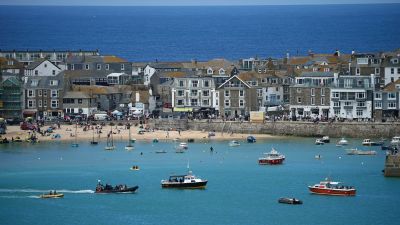Holiday lets in tourist hotspots could require planning permission under new government plans

Second homeowners in England could require planning permission to use their property as a holiday let in a tourist hotspot, under new government proposals.
A consultation has been launched by the Department for Levelling Up, Housing and Communities, which would introduce the requirement for planning permission to turn an existing home into a short-term let in areas where there are high numbers of holiday homes.
There would also be a registration scheme introduced for properties which are used as holiday lets.
The proposed plans will, however, consider whether to give owners the flexibility to let out their homes for up to a specified number of nights in a calendar year without the need for planning permission.
Levelling Up Secretary Michael Gove said the plans will stop local people from being “pushed out of cherished towns, cities and villages" by the rising numbers of short-term lets.
“Tourism brings many benefits to our economy but in too many communities we have seen local people pushed out of cherished towns, cities and villages by huge numbers of short-term lets", he said.
“I’m determined that we ensure that more people have access to local homes at affordable prices and that we prioritise families desperate to rent or buy a home of their own close to where they work.
“I have listened to representations from MPs in tourist hot spots and am pleased to launch this consultation to introduce a requirement for planning permissions for short-term lets.”
The proposals come amid fears that local people in tourist hotspots, including St Ives in Cornwall and Torbay in Devon, are being priced out of the housing market by second homeowners.
In Cornwall alone, some areas have up to 40% of properties being used as second homes.
The plans would give local councils the power through the planning system to control how many homes and which homes would be used as holiday lets.
Catherine Hayes, co-founder of the campaign group First Not Second Homes says the news is a welcome step in tackling the housing crisis, but fears the process could take time to implement.
"We need these kinds of controls in areas where communities are being eroded," she said.
"But I'm hoping it won't take as long as I think it's going to. It's got to come from central government down to local authority."
Culture Secretary Lucy Frazer said: “This new world of ultra-flexible short-term lets gives tourists more choice than ever before, but it should not come at the expense of local people being able to own their own home and stay local.
“The Government wants to help areas get the balance right, and today we have an incomplete picture of the size and spread of our short-term lets market.
“This consultation on a national registration scheme will give us the data we need to assess the position and enable us to address the concerns communities face.”
Councillor Olly Monk, cabinet member for Housing and Planning at Cornwall Council said the scheme could be a step forward in levelling out the "housing playing field".
"I believe the consultation would allow us in Cornwall a much better understanding of how homes are used as holiday lets but give us some control in areas where holiday lets have been deemed an issue", he said.
"It will allow Cornwall to sail its own ship. In some tourist hotspots, we'll be able to look at how many properties are being used as holiday lets."
He added it is important to strike a balance, enabling locals to rent and buy homes, but also encouraging tourism.
Theo Lomas, head of public policy and government relations for northern Europe at Airbnb, said: “Airbnb has long called for a national register for short-term lets and we welcome the Government taking this forward.
“We know that registers are clear and simple for everyday hosts to follow while giving authorities the information they need to regulate effectively.
“The vast majority of UK hosts share one home, and almost four in 10 say the earnings help them afford the rising cost of living.
“We want to work with the Government to ensure that any planning interventions are carefully considered, evidence-based, and strike a balance between protecting housing and supporting everyday families who let their space to help afford their home and keep pace with rising living costs.”
Want a quick and expert briefing on the biggest news stories? Listen to our latest podcasts to find out What You Need To Know…